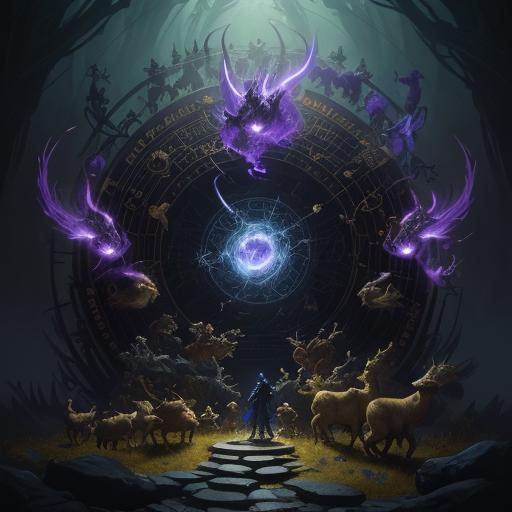College of Convocation (5e Subclass)
College of Convocation[edit]
Bard Subclass
There is a legend of a bard that played his pipe and led all the rats out of a town, then, when the town refused to pay him, he did the same with the children. Does this tale bear a kernel of truth? The piper's feat does not stray too far from what a Convocation Bard can do.
Convocation: a large meeting or the calling to a large meeting. The College of Convocation focuses on the latter. Convocation Bards, often called "Pied Pipers" or "Charmers", use their music to summon creatures to them, much as a wizard or druid might. They are masters of multiple familiars, all of which contribute to their master's magic more directly than even a wizard's can. While there is no evidence they can lure away your children, they do tend to lead a greater horde of summonings than most would expect.
Beware the tune of the Charmer, my friend. Those that dance to it might spell your end.
Songs of Summoning[edit]
When you enter the College of Convocation at 3rd level, you learn the find familiar spell. You can cast find familiar as a ritual, using your instrument instead of material components. The ritual, from beginning to end, includes a song.
You also learn one spell of 2nd level of find steed, healing spirit, or summon beast. This is a Bard spell for you but does not count against your number of known spells. The same applies to every spell learned for this feature. At levels 5, 7, and 9, you learn a spell (from any spell list) with the word "summon" in its title. In order for a spell to be learned, you must be able to cast bard spells of its level. All spells acquired through this feature must be cast through your instrument and song. If the spell has a material component with monetary value, that value is halved for you.
If you use your Magical Secrets feature on a concentration spell with "conjure" or "summon" in its title, the monetary cost of material components is also halved.
Minion Master[edit]
At 6th level, you start to accumulate a following of minor summoned creatures. You can cast the find familiar ritual multiple times without losing the prior familiar, amassing a collection of familiars up to your proficiency bonus or Charisma modifier, whichever is lower. All familiars must be of the same type (celestial, fey, or fiend) but different forms (i.e., they can't all be weasels). They all share the same initiative in combat but, as always, cannot attack. When you cast a spell with a range of touch, one of the familiars conjured by this spell can deliver the spell, as normal. However, you can cast a touch spell through only one familiar per turn.
If one of your familiars is within 10 feet of a creature you summoned, the familiar can use its action to sacrifice itself to heal the summoned creature's hit points by your Charisma modifier + a number of d8s equal to your proficiency bonus. To lose a familiar this way is difficult for a Charmer, like losing a piece of themselves. When a familiar is sacrificed this way, your hit point maximum is reduced by an amount equal to your proficiency bonus. You must finish 1d4+1 long rests before you can summon a replacement familiar, at which point your hit point maximum is restored.
Inspired Focus[edit]
Also at 6th level, the same energy you use to inspire others can be used to bolster your own focus. When you fail a save to maintain concentration, you can use your reaction to expend a bardic inspiration die and add half its roll (rounded up) to your save attempt, possibly turning the failure into a success.
Focus Familiars[edit]
At 14th level, your menagerie of minions can help you build an army of summoned creatures. You can use a bonus action to pass concentration for a summoning spell to one of your familiars. The familiar cannot issue commands and you cannot issue them while the summons is outside your control, but the familiar can maintain concentration for you for up to one minute while the summoned entity carries out standing orders (for summonings that can follow standing orders). You can take concentration back from your familiar with either a bonus action or an action. Just like you, each familiar can only concentrate on one spell at a time.
Your familiar loses concentration if it takes any damage.
Back to Main Page → 5e Homebrew → Character Options → Subclasses

